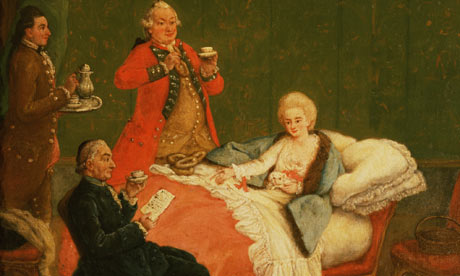
As the first decade of the 21st century draws to a close, critics will begin sifting back to find the prevailing themes of its novelists. This, of course, is a task which should produce no definitive answer, literature's breadth making neat packaging tricks difficult. But critics, like writers, deal in serviceable narratives, and one of these is to argue that those works which nail the zeitgeist are written and read mainly by the young. The 80s kids (Amis, Easton Ellis, McInerney) excoriated Reagan-Thatcherite excess, while the disaffected, hedonistic 90s explored Welshian chemical states. What the Noughties thought about every seven seconds, though, was porn.
By the end of the 90s, the explicit lesbianism of Sarah Waters's Tipping the Velvet (1999) or the frank adolescent narrator of Rebbecca Ray's A Certain Age (1998) were causing a stir. But books to get you off were still largely confined to the section where shady men lurked, thumbing black-spined books with photographs of bums on them. Soon, however, the crossover success of Catherine Millet's The Sexual Life of Catherine M (2001) meant that no branch of WH Smith's was complete without a display of upmarket but extremely upfront memoirs by female writers.
What also changed was the whole manner in which sex was being depicted. Gone was the cringeworthy purple prose of writers terrified of being mistaken for hacks. The new breed called a cock a cock. Not only did Belle de Jour and the narrator of Girl With a One-Track Mind admit that they simply loved sex, but so too did the women reading them in their millions.
Ironically, it is British men (and I'd have to include myself in this) who have been been more uptight about it all. Forthright their language may be, but works such as Irvine Welsh's Porno (2002), Adam Thirwell's Politics (2003), Ewan Morrison's The Last Book You Read (2005), Joe Stretch's Friction (2008) and Chris Killen's The Bird Room (2009) mainly posit men as slaves to their own addictions, and sex as often joyless, anxious or repetitive, another empty product of consumerism or manifestation of power play. There may be reasons for this. Male novelists are more prone to grandstanding, state-of-the-West diagnoses, which generally have to be negative to be taken seriously. JG Ballard was the quintessential novelist of this type: sex is always part of some larger, late-capitalist malaise. Straight, male writers are also worried about appearing misogynist, and so tend to layer their sex with nervous, sociological misgivings. Rarely is there the sheer exultation of the women.
Surely only a woman, for example, could have produced the decade's most sensational and taboo-busting novel. The narrator of Charlotte Roche's Wetlands (2009) takes pleasure in wiping her genitals over toilet seats and flouting hygiene standards. The body was politicised for women and gay men decades ago, making it possible for Roche to now work at the level of smegma, menstrual blood and haemorrhoids. The heterosexual male gaze, though, goes in a different direction. Unlike straight women, straight men are still afraid to look at or enjoy bodies of the same sex, even their own. This leads only to a partial consciousness. One sees no such trepidation in, say, Alan Hollinghurst.
As with the act itself, appetites for literary sex become jaded. What was once daring and unconventional soon becomes repetitive cliché. It's hard to imagine what there is left to say on the topic after Wetlands, or Chuck Palahniuk's Snuff, concerning the world's largest gang bang.
Last week at the Edinburgh international book festival, in a discussion of my latest novel, Death of a Ladies' Man, I was quizzed by the chair on the book's connections to my own sex life. That wouldn't have been asked of a writer 10 years ago. Perhaps the vogue for the next decade should be a new coyness. After all, what's more sexy than a blush?

